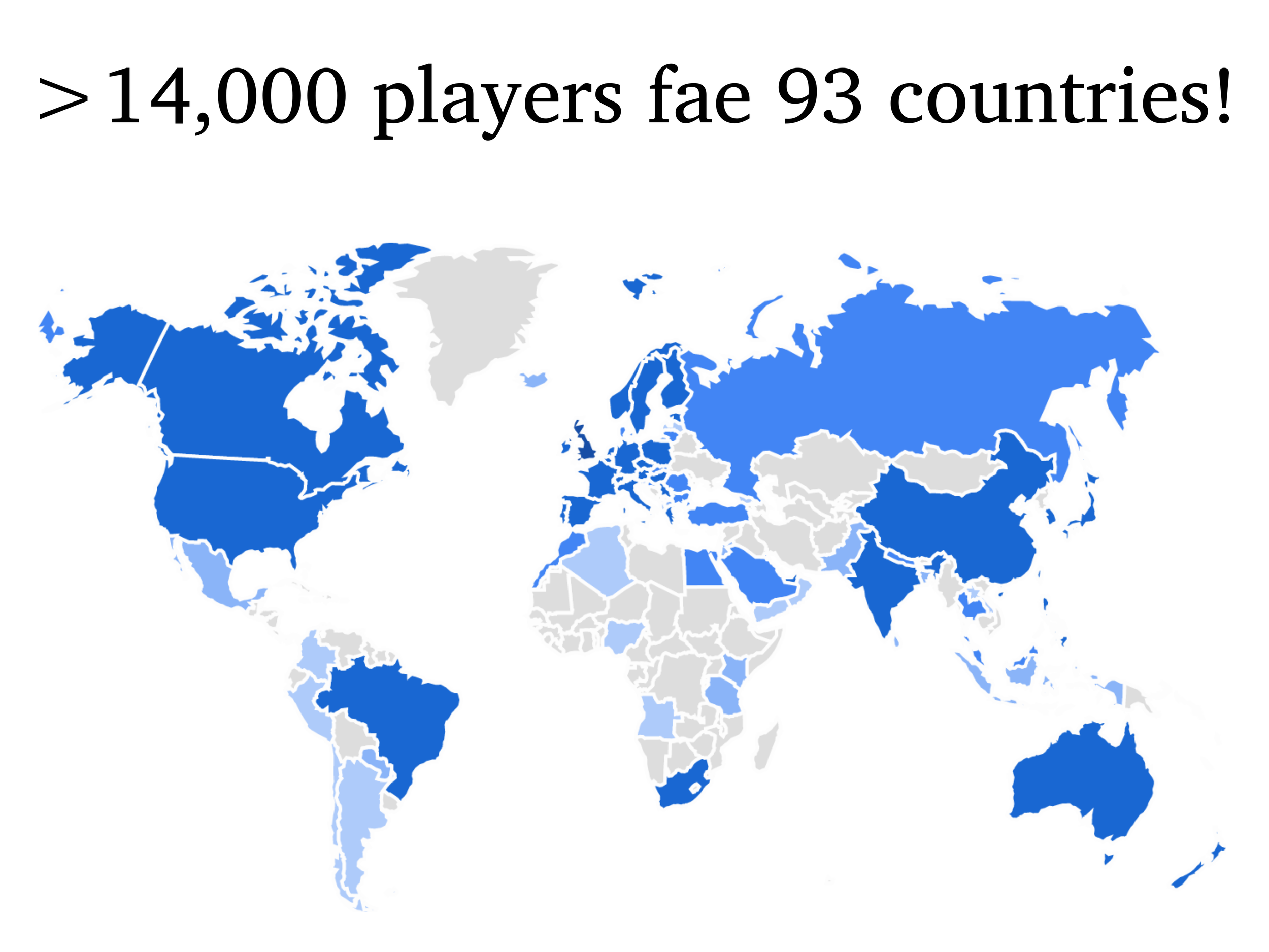Wirdle solutions week 14
W'ir blyde tae announce dat, as o daday, da Shaetlan Wirdle is haed mair as 14,000 players fae 93 countries. Here's da solutions fir dis week! Scroll fir ee wird at a time tae git da richt answer, it's meaneen, an da history o da wird. Last you'll fin da main references at we øse fir da etymologies, an da latest map o players. You'll fin da priciples o wir spelleen system at https://www.iheardee.com/shaetlan/spellin-in-shaetlan
✅
Hit's important tae mind at "Aald English" wis nivver a monolithic language, reider hit's a cover term fir fower distinct Nort Sea Germanic varieties. Da direct ancestor tae Scots wis Northumbrian Aald English. Da direct ancestor tae English wis Mercian Old English. But maist o whit data is left comes fae Wast Saxon Aald English. Wharivver possible w'ir gien da Northumbrian Aald English forms, seein as da main ancestors tae Shaetlan is Norn an Scots (no English), wi a lok o Dutch/Low German influence.
✅
Wir tanks agein tae Julie fir tinkin up da idee, an tae Andrew fir makkin it possible! 🤗
fling ‘fling, throw; keeck’
History: baith English an Scots got dis wird fae Aald Norse. Da Aald Scots fling, flyng is attestit fae 1375 wi da meaneen ‘tae keeck’ an fae 1528. wi da meaneen ‘tae daance’ Da Aald Norse flengja ‘tae whip; tae fling’ is still Icel. flengja, Far fleingja ‘tae skelp’, No. flenge ‘tae (violently) rip oppen/aff’, Sw. flänga, Da. flænge ‘tae fling; tae rush (aboot)’. Hit ultimately comes fae Proto-Germanic *flangijaną ‘tae strick, whip’, at comes fae Proto-Indo-European *plah₂k-/*plah₂g- ‘to strick’.
heivy ‘heavy’
History: de’r twartree forms attestit athin Aald Scots, laek hevy(e), hevi(e), hewy(e), h(e)avy, ha(y)vie, hawy(e), etc. Da nort Aald English form wis hæfig an hit cam fae Proto-Germanic *habīgaz ‘heivy; severe’, at in turn cam fae Proto-Indo-European *keh₂p- ‘tae grip, tak, saize, hadd’.
vaams plural o vaam ‘a spell; a guff, fyunk’
History: dis wird is Shetland specific. Hit comes fae da Aald Norse vamm ‘injury, blibe, flaa’, at itsel is a bit o a mystery, but it haes twartree Aald Germanic cognates, laek da Gothic *wamm ‘plook, blibe’. Da ultimate origin isna kent o, but it micht ging back tae da Proto-Indo-European *wem- ‘slavers, speweens’.
eense ‘once’
History: da airliest Scots forms is anis an anys, but ainis an anes shün cam efter. Da wird comes fae Aald English ænes, anes, etc meanin ‘eense’. Hit wis wint tae be da Aald English ǽne ‘eense’ + da genitive (possesive) suffix -es, Da final unvoiced -s startit tae be spelt -ce fae aboot da airly 16t C. Da forms wi a back roonded vowel (o-soond) isna sae aald as da nort front unroondit vowel (e-/æ- soond) an dey onny start in Middle English idda sooth varieties. See wir posst fae 3 Janiwirry 2022.
swaet ‘sweat’
History: Aald Scots haed twartree forms, laek swet(e), sweit, sweat, etc. Dey come fae da Aald English swætan ‘tae swaet’ an swāt ‘swaet’, an dey come fae da Proto-Germanic *swait- ‘swaet’ an ultimately it gings back tae da Proto-Indo-European *sweyd- ‘swaet; tae sweat’.
floss ‘the rush (Juncus effusus)’
History: dis wird is onny attestit idda former Norn spaekkin plaesses. Da foremaist attestations is fae Orkney (floss in 1623 an flos ‘band’ in 1633). Da origin o da words isna kent o, but hit micht come fae Aald Norse flus ‘tin skaen, rind’, at is still tae da fore in No. flos, flus, ‘a skaen, a scael still flipit aff (e.g. taatie peeleens)’ an flysja ‘tae peel’, (cf. firbye Far. flus ‘peeleens, dandruff’ an Sw. flasa ‘tae peel pick fluff aff o, etc’). Da semantic shift wid in yun caess laekly be becis o whit floss is øsed fir.
tresh ‘thresh’
History: dis is a braaly aald wird. Da Aald English þrescan, ðærsca, ð(e)arsca gings back tae Proto-Germanic *þreskaną ‘tresh’, at gings back tae da Proto-Indo-European *terh₁- ‘tae rub, turn; tae dreel, proadge’. Fir mair aboot da “th”-soonds in Shaetlan, see wir posst fae 23 October 2021.
References
Bokmålsordboka. 2022. Språkrådet og Universitetet i Bergen. Available at http://ordbøkene.no.
Christie-Johnston, Alastair & Adaline Christie-Johnston. 2014. Shetland words. A dictionary of the Shetland dialect. Lerwick: The Shetland Times.
de Vaan, Michiel. 2008. Etymological dictionary of Latin and the other Italic languages. Leiden, Boston: Brill
de Vries, Jan. 1977. Altnordisches etymologisches Wörterbuch. Leiden: Brill.
DSL Online. 2002. Glasgow: The University of Glasgow. Available at https://dsl.ac.uk/.
Heggestad, Leiv, Finn Hødnebø & Erik Simensen. 1993. Norrøn ordbok. 4th edn of Gamalnorsk ordbok. Oslo: Det norske samlaget.
Hellquist, Elof. 1993. Svensk etymologisk ordbok. 3rd edn. 2 Vols. Malmö: Gleerups.
Jakobsen, Jakob. 1985 [1928]. An etymological dictionary of the Norn language in Shetland. Lerwick: The Shetland Times.
Kroonen, Guus. 2013. Etymological dictionary of Proto-Germanic. Leiden: Brill.
Lehmann, Winfred P. 1986. A Gothic etymological dictionary. Leiden: Brill.
Macbain, Alexander. 1911. An etymological dictionary of the Gaelic language. Stirling: Eneas Mackay.
Marwick, Hugh. 1929. The Orkney Norn. Oxford: Oxford University Press.
Matasović, Ranko. 2009. Etymological dictionary of Proto-Celtic. Leiden: Brill.
Nielsen, Niels Åge. 1995. Dansk etymologisk ordbog. Ordenes historie. 4th edn. København: Gyldendal.
Nynorskordboka. 2022. Språkrådet og Universitetet i Bergen. Available at http://ordbøkene.no.
OED Online. 2021. Oxford: Oxford University Press. Available at https://www-oed-com.ezproxy.uni-giessen.de.
Orel, Vladimir. 2003. A handbook of Germanic etymology. Leiden: Brill.
Pfeifer, Wolfgang (ed.). 1997. Etymologisches Wörterbuch des Deutschen. München: Deutscher Taschenbuch Verlag.
Pokorny, Julius. 1994. Indogermanisches etymologisches Wörterbuch. 3rd edn. 2 Vols. Tübingen: Francke Verlag.
Torp, Alf. 1919. Nynorsk etymologisk ordbok. Kristiania: Forlaget H. Aschehoug & Co.
Zoëga, Geir T. 1896. English-Icelandic dictionary. Reykjavík: Sigurður Kristjánsson.
Zoëga, Geir T. 1922. Icelandic-English dictionary. 2nd edn, enlarged. Reykjavík: Sigurður Kristjánsson.

